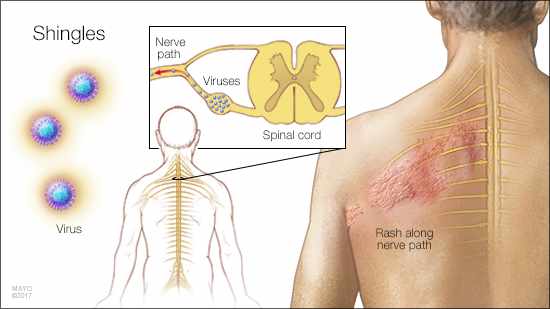-
Cardiovascular
Shingles sufferers could face risk of stroke, heart attack
People who develop shingles have a 59 percent higher risk of heart attack than those who don't get the viral infection. That's according to a report published in the Journal of the American College of Cardiology, which also claims there's a 35 percent higher risk of stroke for those who get shingles.
The report says "the risks of both stroke and heart attack were highest the first year after the onset of shingles and decreased with time."
Shingles is the same virus that causes chickenpox. It becomes a painful rash that can occur anywhere on your body. If you've had chickenpox, the virus can remain inactive in nerve tissue near your spinal cord and brain. Then, years later, it can reactivate as shingles.
"Anything that increases inflammation in your body increases your risk for heart attack. It could be an infection caused by a virus, such as shingles or the flu, or by bacteria, such as a bladder infection."
- Dr. Stephen Kopecky
Dr. Stephen Kopecky, a Mayo Clinic cardiologist not involved with the research, says most heart attacks occur because inflammation in an artery in the heart causes the lining of the artery to tear after which a blood clot forms and closes off the artery. He adds, "Anything that increases inflammation in your body increases your risk for heart attack. It could be an infection caused by a virus such as shingles or the flu, or by bacteria, such as a bladder infection."
Dr. Kopecky adds, "We know that an annual flu shot not only reduces your chance of getting the flu but also reduces your risk for heart attack over the next flu season by 50 percent, because it reduces the inflammation that occurs throughout your body."
In the American College of Cardiology news release, Dr. Kim Eagle, editor-in-chief of ACC.org, says, "While these findings require further study into the mechanism that causes shingles patients to have an increased risk of heart attack and stroke, it is important that physicians treating these patients make them aware of their increased risk."
Learn more about shingles in these related Mayo Clinic News Network posts:
- Mayo Clinic Minute: Don’t suffer with shingles
- Shingles: Not just a band of blisters
- Treating (or preventing) pain after shingles
- Mayo Clinic Q&A: Vaccine recommended for older adults even if they’ve had shingles
- Mayo Clinic Q&A: Shingles more common after age 50 but can affect younger people








